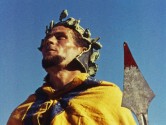
The School of Reis:
The Films and Legacy of António Reis and Margarida Cordeiro
Little known in the US, António Reis (1927-1991) is revered in his native Portugal as a visionary artist whose films and many years as a beloved teacher and mentor exerted an immeasurable influence over the post-Salazar rebirth of Portuguese cinema and the new generation of filmmakers that emerged in the 1980s and 1990s. Born in Oporto, Reis found renown first as a poet before meeting the great Manoel de Oliveira who invited Reis to be assistant director on Oliveira’s first radical masterpiece, Rite of Spring, working alongside another important collaborator, Paulo Rocha. The pioneering mode of poetic ethnographic cinema which Oliveira and Reis definedguided the course of the four extraordinary works Reis co-directed with his wife, the psychiatrist Margarida Cordeiro (b. 1939), culminating in Trás-os-Montes, a lyrical search for the very “soul” of Portuguese culture and history in the myths and peasant folklore embodied in Portugal’s remote far-north region. Admired by the likes of Joris Ivens, Jean Rouch and Jean-Marie Straub, the films of Reis and Cordeiro invented a poetically liberated and hypnotically cinematographic film language, a style and sensibility that set the course of Portugal’s lasting tradition of radical cinema, exerting a formative influence, for example, upon João Cesar Monteiro. Yet equally important was Reis’ career and legacy as a long-time senior professor of film production and aesthetics at Lisbon’s Escola Superior de Teatro e Cinema. As a tribute to Reis’ inspiration of the most important talents in contemporary Portuguese cinema, this retrospective includes a selection of works by Reis’ students including Pedro Costa, João Pedro Rodrigues and Joaquim Sapinho. – Haden Guest

















